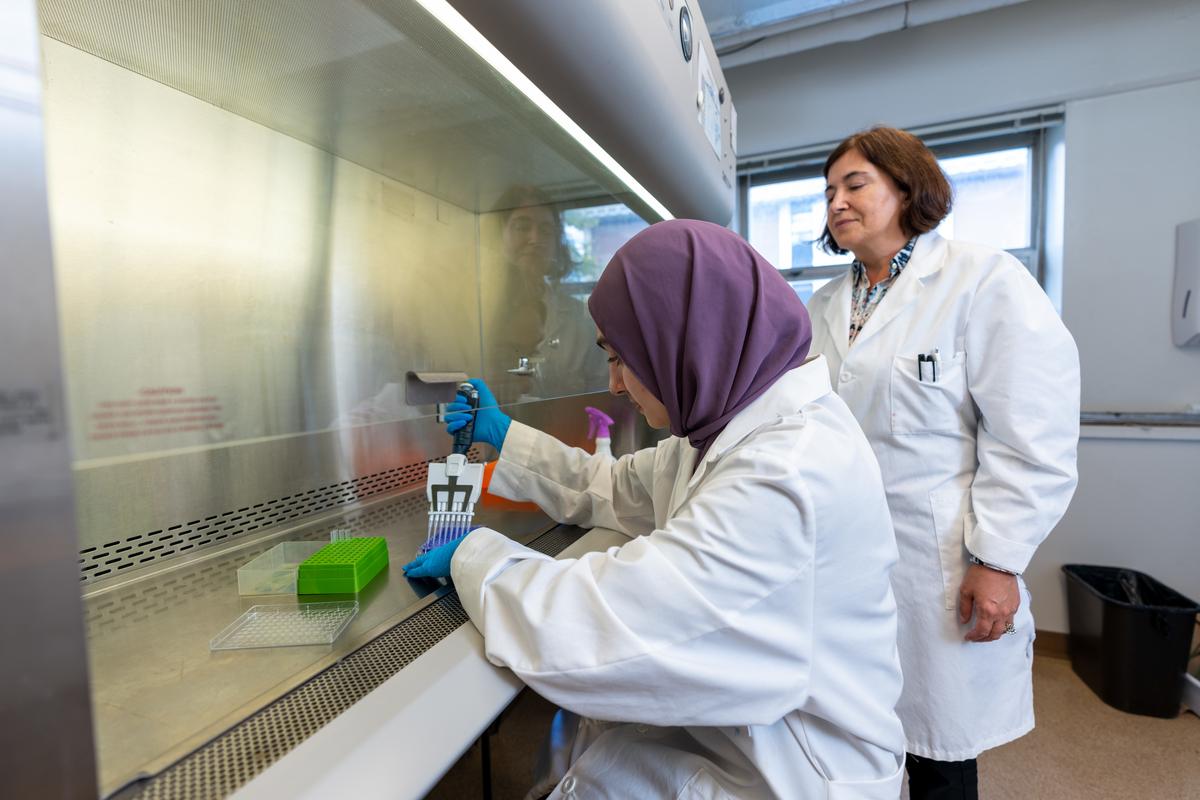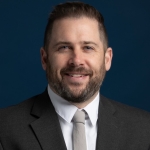Marquette University awarded second $3.8 million Department of Defense grant for ‘In Defense of Water’ project
Aug. 3. 2023
 MILWAUKEE — Marquette University has received a second two-year, $3.8 million U.S. Department of Defense grant for an ongoing interdisciplinary program titled “In Defense of Water” to develop novel, sustainable technologies to protect human health and the environment, treat sewage, and provide clean drinking water and a framework for emergency response to water contamination.
MILWAUKEE — Marquette University has received a second two-year, $3.8 million U.S. Department of Defense grant for an ongoing interdisciplinary program titled “In Defense of Water” to develop novel, sustainable technologies to protect human health and the environment, treat sewage, and provide clean drinking water and a framework for emergency response to water contamination.
The first award for “Novel Technologies to Mitigate Water Contamination for Resilient Infrastructure,” was awarded in late 2021 and expanded upon the water technology development researchers at Marquette have been doing for decades to help provide clean drinking water and protect the environment.
“This new award expands the scope and reach of Marquette’s water research community,” said Dr. Jeanne Hossenlopp, vice president for research and innovation. “This second installment in the ‘In Defense of Water’ program will support a cross-campus interdisciplinary team of faculty and students, in partnership with researchers at the U.S. Army Engineer Research and Development Center, to address critical water infrastructure and community risk and resiliency issues of importance to both military and civilian populations.”
The second iteration aims to improve water security and efficiency on military installations to reduce negative readiness and operational impacts due to water shortages and employ innovative water management technologies. Furthermore, the work addresses cleanup related to PFAS at current and former military installations, including many in Wisconsin. The project entails seven areas of focus and encompasses 11 faculty members from six departments across five colleges and schools, as well as the Water Law and Policy Initiative and the Water Quality Center.
“Regardless of where you live, work and play, every Wisconsinite deserves access to clean drinking water and an environment free of toxic chemicals,” said Sen. Tammy Baldwin, who, alongside Rep. Gwen Moore, has supported Marquette’s grant proposal. “I’m proud to support research to achieve these goals.”
“Access to clean water is an imperative for the health, safety and wellbeing of children and families. Research can help us eradicate the harmful pollutants that threaten this access and worsen health care disparities,” Rep. Moore said. “I am excited to support innovative ways to address water-related issues like PFAS and lead, which will help protect the health of our communities and our military.”
Specific objectives include research and development to advance focus areas through seven projects:
- Area 1: “Investigating the effects of disinfection on the persistence of surface-associated pathogens”
- Lead investigator: Krassimira Hristova, professor of biological sciences and principal investigator of the phase II grant
- Area 1 will advance research on the efficacy of various coatings and novel disinfectants to inactivate bacterial pathogens, viruses and biofilms. The mechanisms of disinfectant, or probiotic on triggering changes in antimicrobial resistance of opportunistic pathogens and the implications for dissemination in the built environment will be clarified.
- Area 2: “Electroremediation of PFAS”
- Lead investigator: Chris Marshall, assistant professor of biological sciences
- Area 2 will advance research and development of an innovative system to combine electrochemical removal of PFAS with subsequent bioelectrochemical degradation and destruction. The system could be used in a range of applications, including drinking water treatment, wastewater treatment and in situ removal in soils and sediments.
- Area 3: “Water data fusion and analytics for resilient infrastructure to mitigate soil and water contamination”
- Lead investigator: Anthony Parolari, assistant professor of civil, construction and environmental engineering
- Area 3 will develop a data- and policy-driven approach to mitigate water quality degradation. PFAS characterization in surface water and stormwater matrices, and subsequent treatment will be evaluated.
- Area 4: “DFF Anaerobic Membrane Bioreactor (AnMBR) for Sewage Treatment”
- Lead investigator: Daniel Zitomer, chair and professor of civil, construction and environmental engineering
- Sewage is typically treated using aerobic biotechnology with microorganisms that use oxygen to remove pollutants. Unfortunately, this required significant energy for blowers to deliver air/oxygen. In contrast, anaerobic biotechnology involves microbes that do not use oxygen and that convert sewage to biogas that contains methane, which can be used to produce heat and electricity. Area 4 will develop a sustainable anaerobic downflow filter membrane bioreactor to treat sewage and replace less sustainable processes.
- Area 5: “Protect and assess water assets and environmental health at military installations through remote sensing and machine learning”
- Lead investigator: Walter McDonald, assistant professor of civil, construction and environmental engineering
- Area 5 will work to develop a framework to protect and assess water assets and environmental health at military installations through remote sensing and machine learning.
- Area 6: “The impact of water chemistry on the dynamic relationship between metal pipes, corrosion, and microbial communities”
- Lead investigator: Patrick McNamara, associate professor of civil, construction and environmental engineering
- Area 6 will aim to understand how water chemistry parameters affect corrosion of metals, including lead, and impact the microbial community and antibiotic resistance.
- Area 7: “Risk and Resiliency in Communities Impacted by PFAS”
- Lead investigators: Amber Wichowsky, chair and professor of political science, and Dr. Jill Birren, associate professor of educational policy and leadership
- Area 7 will examine public awareness and understanding of PFAS risks and mitigation efforts in Wisconsin. The research will aim to inform crisis response plans for communities most impacted by PFAS and lead in drinking water and help provide a framework for effective risk communication strategies for communities across Wisconsin.
Other faculty investigators include: Dr. Brooke Mayer (Areas 1, 2), associate professor of civil, construction and environmental engineering; David Strifling (Areas 3, 7), adjunct professor of law and director of the Water Law and Policy Initiative; Dr. Joseph LaManna (Area 5), assistant professor of biological sciences; and Dr. Andrew Meyer (Area 7), chair and professor of economics. Additionally, many of the area lead investigators and participating in other areas.
The U.S. Army Engineer Research and Development Center (ERDC) is an integral component of the Office of the Assistant Secretary of Defense for Research and Engineering and helps solve the nation’s most challenging problems in civil and military engineering, geospatial sciences, water resources, and environmental sciences for the Army, Department of Defense, civilian agencies, and the nation’s public good. The ERDC strives to be the world’s premier public engineering and environmental sciences research and development organization.
About Marquette University
Marquette University is a Catholic, Jesuit university located near the heart of downtown Milwaukee that offers a comprehensive range of majors in 11 nationally and internationally recognized colleges and schools. Through the formation of hearts and minds, Marquette prepares our 11,100 undergraduate, graduate, doctoral and professional students to lead, excel and serve as agents of positive change. And, we deliver results. Ranked in the top 20% of national universities, Marquette is recognized for its undergraduate teaching, innovation and career preparation as the sixth-best university in the country for job placement. Our focus on student success and immersive, personalized learning experiences encourages students to think critically and engage with the world around them. When students graduate with a Marquette degree, they are truly prepared and called to Be The Difference.
About Kevin Conway

Kevin is the associate director for university communication in the Office of Marketing and Communication. Contact Kevin at (414) 288-4745 or kevin.m.conway@marquette.edu.
 MILWAUKEE — Marquette University has received a second two-year, $3.8 million U.S. Department of Defense grant for an ongoing interdisciplinary program titled “In Defense of Water” to develop novel, sustainable technologies to protect human health and the environment, treat sewage, and provide clean drinking water and a framework for emergency response to water contamination.
MILWAUKEE — Marquette University has received a second two-year, $3.8 million U.S. Department of Defense grant for an ongoing interdisciplinary program titled “In Defense of Water” to develop novel, sustainable technologies to protect human health and the environment, treat sewage, and provide clean drinking water and a framework for emergency response to water contamination.
